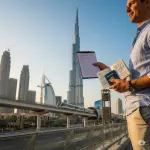Welcome to Dubai! The City of Gold, a global hub of business, luxury, and culture, awaits you. Whether you've moved here for a new job, a family relocation, or a long-term investment, your first week will be a whirlwind of excitement and essential tasks. The key to a smooth transition is to tackle these to-dos with a clear, step-by-step plan.
This comprehensive guide is designed to be your personal checklist, helping you navigate the first seven days in Dubai with confidence. We’ll cover everything from your arrival at the airport to getting your first home connected and understanding the city’s magnificent public transport. Let's dive in.
Day 1: Arrival and First Impressions
Your journey begins the moment you step off the plane at Dubai International Airport (DXB). This isn’t just an airport; it’s a high-tech gateway to the city.
- Immigration and Visa: Your first major step is passing through immigration. If you’ve arrived on an employment or residency visa, you’ll be directed to a specific counter. The process is generally swift and efficient. The officer will verify your documents, take your fingerprints, and stamp your passport. If you are eligible for a visa on arrival, this will also be processed here.
- Get Your Free SIM Card: As you exit the immigration area, you'll be greeted by stands from the UAE's major telecom providers: Etisalat, Du, and Virgin Mobile. All new arrivals are now given a free SIM card, often with a small amount of data, which is a fantastic head start. Activate it immediately so you can use apps like Google Maps and contact your accommodation or driver.
- Transportation to Your Accommodation: The best way to get to your hotel or new home is by taxi or the Dubai Metro. The Metro is directly connected to Terminals 1 and 3 at DXB. Simply follow the signs. Taxis are plentiful, well-regulated, and metered. For a first-timer, a taxi is a hassle-free option that takes you directly to your door. Alternatively, ride-hailing apps like Careem and Uber are widely used.
Day 2: Settling In and Paperwork
After a good night's sleep, it's time to start tackling the essential paperwork that will make you an official resident.
- Begin Your Visa and Emirates ID Process: For most new residents, your employer or a dedicated PRO (Public Relations Officer) will handle the bulk of the visa process. This will involve a medical fitness test (usually a blood test and chest X-ray) and fingerprinting for your Emirates ID. You will receive an SMS when your Emirates ID application is ready.
- Sort Out Your Accommodation: If you have temporary accommodation, the first few days are an excellent time to look for a long-term home. Use a reputable property finder website like Property Finder or Bayut. If you’ve already secured an apartment, this is the day to move in and get settled.
- Initiate Your DEWA Connection: DEWA, the Dubai Electricity and Water Authority, is your utility provider. Your landlord or a real estate agent can help you with the Ejari registration, which is the official tenancy contract. Once your Ejari is registered, you can easily activate your DEWA account online or via their app. You will need a copy of your Emirates ID and Ejari contract to complete the process.
Day 3: Financial Fundamentals
Dubai is a cash-light society, and having a local bank account is a must for managing your salary, paying bills, and daily transactions.
- Opening a Bank Account: This is a top priority. Your employer will need your bank details to transfer your salary. You can open a bank account only after your residence visa is stamped on your passport and you have your Emirates ID (or at least the application receipt). Visit a reputable bank like Emirates NBD, First Abu Dhabi Bank (FAB), or HSBC, which have dedicated services for expatriates.
- Documents for Account Opening: Be prepared with your original passport and a copy of your visa, your Emirates ID (or the application receipt), a salary certificate from your employer, and sometimes a No-Objection Certificate (NOC). The process can take a few days to a week.
- Exchange Some Currency: While cards are widely accepted, it’s useful to have some cash on hand. You can exchange currency at most shopping malls and at the airport.
- Consider Health Insurance: All residents in Dubai must have health insurance. Most employers provide a policy as part of your employment package. Familiarize yourself with your coverage, including hospital networks and out-of-pocket expenses.
Day 4: Transportation and Mobility
Dubai's sprawling layout makes it a city built for cars. However, its public transport system is world-class and perfect for getting around during your first week.
- Get a Nol Card: The Nol card is your key to Dubai’s public transportation network. It's a rechargeable smart card that you can use on the Metro, Tram, buses, and even some RTA taxis and water taxis. You can buy one from any Metro or bus station and top it up at ticket machines.
- Navigate the Metro: The Dubai Metro is clean, efficient, and air-conditioned, making it the fastest way to get to many of the city's key areas, including Downtown Dubai, Mall of the Emirates, and the Marina. Study the metro map and plan your journey using the RTA app or Google Maps.
- Explore Ride-Hailing Apps: Get acquainted with Careem and Uber. They are reliable and often more convenient for shorter trips or when traveling to areas not serviced by the Metro.
- Think About a Car: If you plan on staying long-term, you’ll eventually consider getting a car. Renting is a popular option for the first few months, as it allows you to get a feel for the city's traffic and road network before committing to a purchase.
Day 5: Groceries and Household Essentials
Your pantry is probably bare, and it's time to stock up. Dubai offers a wide range of grocery stores, from budget-friendly hypermarkets to premium imported goods.
- Find Your Local Supermarket: Identify the major supermarkets in your area.
- Carrefour & Lulu: These are the big hypermarkets where you can find everything from groceries to electronics and home goods. They are excellent for budget-conscious shoppers and bulk buys.
- Spinneys & Waitrose: These are more premium supermarkets, popular with expats, offering a wider range of imported products and high-quality fresh produce.
- Union Coop: This is a local co-operative known for its competitive pricing and a great selection of fresh local produce.
- Discover Online Grocery Apps: For ultimate convenience, download apps like Instashop, Talabat, and Carrefour Now. They offer on-demand delivery from a variety of supermarkets directly to your door, often in under an hour.
- Set Up Your Internet: Now that you have a local SIM, it's time to arrange a home internet connection. Etisalat and Du are the main providers. You can visit one of their stores in a mall or order a home internet package online.
Day 6: Cultural Immersion and First Adventures
Your first week shouldn't be all work and no play. Now that the essentials are covered, take some time to explore.
- Visit the Old Dubai Souks: Take an Abra (a traditional wooden boat) across Dubai Creek for just 1 AED and explore the Gold, Spice, and Textile Souks in Deira and Bur Dubai. This is a must-do to experience the city's rich history.
- Respect the Dress Code: While Dubai is a modern city, it's a good practice to dress respectfully in public spaces. For women, this means covering your shoulders and knees. In tourist areas, this rule is more relaxed, but it's always better to be modest, especially when visiting religious sites or government buildings.
- See the Icons: Head to Downtown Dubai to marvel at the Burj Khalifa. You can book a ticket to its observation deck or simply watch the magnificent Dubai Fountain show from outside The Dubai Mall.
- Enjoy Your First Dubai Brunch: Brunch is a major social tradition in Dubai, usually held on a Friday or Saturday. It's a great way to meet new people and experience the city's vibrant social scene.
Day 7: Community and Connection
Your final day of the week is about looking ahead and building a support network.
- Join Expat Groups: Social media platforms like Facebook have numerous groups for expats in Dubai. Search for groups that match your nationality, interests, or profession. These are invaluable resources for advice, making friends, and finding events.
- Plan for the Future: Now that you've completed the essential first-week tasks, you can start thinking about your long-term goals. Do you want to join a sports team, take a class, or volunteer?
- Relax and Reflect: Take a moment to relax, maybe at a local café or on a beach. Reflect on the past seven days and appreciate the incredible journey you have just started.










